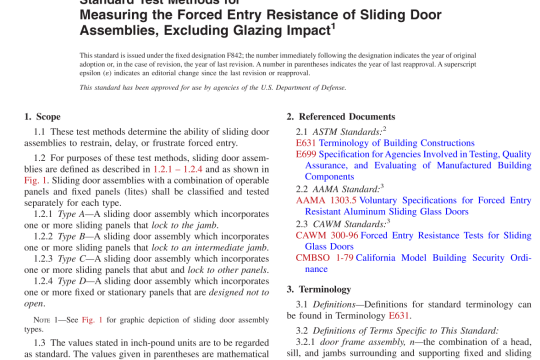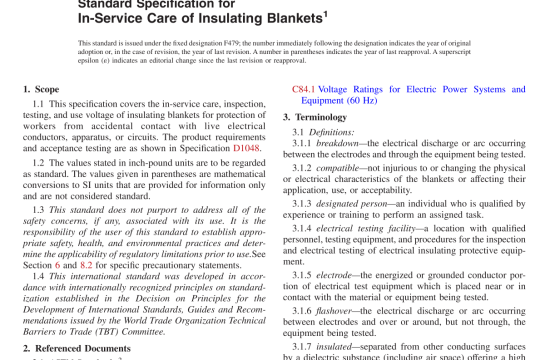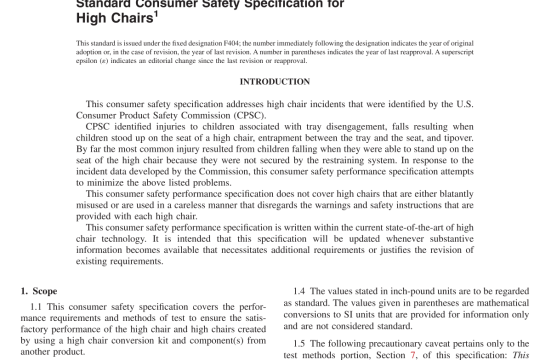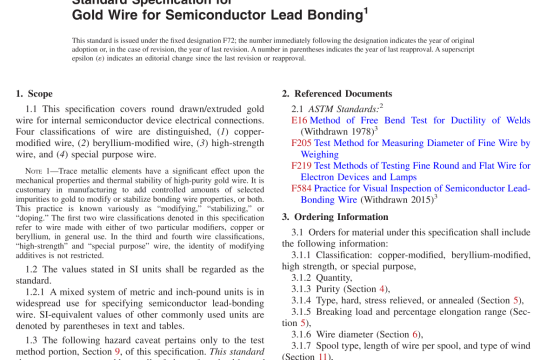ASTM D5833-12(R2020) pdf free download
ASTM D5833-12(R2020) pdf free download.Standard Guide for Source Reduction Reuse, Recycling, or Disposal of Steel Cans
1. Scope
1.1 This guide provides general information to public offi- cials and business and industry managers regarding the source reduction, reuse, recycling, or disposal of steel cans under 5-gal (wet) or 40-lb (dry) capacity. It presents a comprehensive overview ofthe steel can life cycle. Five-gallon pails and larger containers, up to 55-gal drums, will be in a separate guide due to their inherently different use and management when empty. 1.2 The values stated in inch-pound units are to be regarded as standard. No other units ofmeasurement are included in this standard. 1.3 This standard does not purport to address all of the safety concerns, if any, associated with its use. It is the responsibility of the user of this standard to establish appro- priate safety, health, and environmental practices and deter- mine the applicability ofregulatory limitations prior to use. 1.4 This international standard was developed in accor- dance with internationally recognized principles on standard- ization established in the Decision on Principles for the Development of International Standards, Guides and Recom- mendations issued by the World Trade Organization Technical Barriers to Trade (TBT) Committee.
5. Typical Steel Can Container Applications
5.1 Food Cans—More than 90 % of metal food containers, also known as sanitary cans, are made of steel (1). 4 While they have been commonly called “tin” cans, the tin coating on steel sheet has become extremely thin as technology advanced. It has been supplemented or replaced by other alternative coat- ings and treatments so that about one third of all steel cans are now made with tin-free steel (2). Steel food cans contain many types of food products, such as meat, fruit, vegetables, soup, infant formula, and pet food. (See Fig. 1.) 5.1.1 Single-Serving or Home-Use Container—Steel food cans vary in size and style, in accordance with product and consumer requirements. Can size may range from a few ounces to the typical one-pound net weight container used in the home. They are normally opened with an ordinary manual or electric can opener, but some have aluminum or steel easy-open lids for greater convenience to the consumer. 5.1.2 Multi-Serving or Commercial/Institutional Container—Steel food cans are widely used in business and institutional food service facilities and food manufacturing plants. This includes 1-gal (#10) cans and oblong cans, such as for olive oil. 5.2 Beverage Cans—Steel cans are widely used for juices and other non-carbonated beverage applications. They may also be used for beer or soft drinks. (See Fig. 1)5.2.1 Single-Serving Container—Steel beverage cans vary in size and style. The 6-oz juice can, commonly used for school lunches, has a foil peel-off closure on the lid, although some now have an all-steel stay-on tab. 5.2.2 Multi-Serving or Commercial/Institutional Container—Larger beverage containers, from 46 oz (#5) to 1 gal (#10), are used for home, business, institutions, and food manufacturing. 5.3 General Purpose Cans—Steel cans have many non-food and non-beverage applications, wet or dry, for the household, business, and industry. (See Fig. 1) 5.3.1 Single-Serving or Home-Use Container—Smaller cans up to 1 gal are typical. Numerous styles and sizes of cans are required because of the wide array of products and applications, including liquid products (such as paint), powders (such as talc), semisolids (such as paste wax), aerosols (such as hair spray), and dry goods (such as adhesive bandages or roller bearings). Many have replaceable lids that are pried offto open the container. Aerosol cans are sealed and release product through a spray valve until empty. 5.3.2 Industrial or Commercial/Institutional Container— Larger general purpose containers, including 5-gal pails and steel drums of various capacities will be covered in a separate guide.




